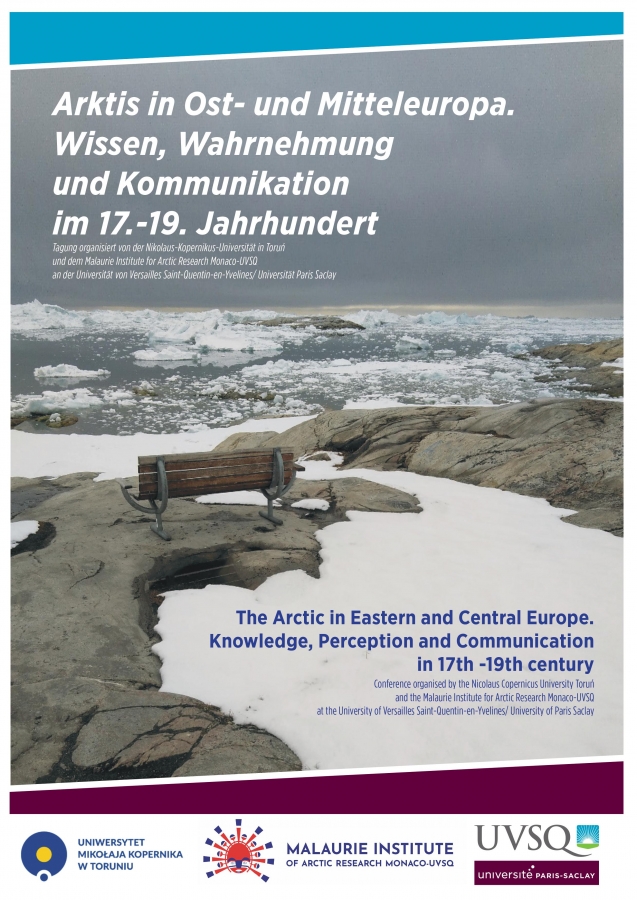
Katedra Literatury, Kultury i Mediów Niemieckiego Obszaru Językowego oraz Malaurie Institute for Arctic Research Monaco-UVSQ at the University of Versailles Saint Quentin-en-Yvelines/ University of Paris/Saclay
zapraszają do udziału w konferencji naukowej
Arktyka w Europie Wschodniej i Środkowej. Wiedza, percepcja i komunikacja w XVIII-XIX w.
08-11 maja 2024 r., w Toruniu
C 0.39 Coll. Humanisticum, ul. Bojarskiego 1
Wyobrażenia o Arktyce pobudzały wyobraźnię Europejczyków od czasów antycznych, ale dopiero od końca XVII wieku zaczęto systematycznie gromadzić o niej wiedzę. Ważną rolę w tych działaniach odegrali niemieccy protestanci, którzy inspirowani ideami pietyzmu i Ewangelickiej Jednoty Braterskiej stopniowo rozszerzali obszar swojej pracy misyjnej o daleką północ. Motywacje ekonomiczne z kolei przyświecały Holendrom, Francuzom, Baskom i Anglikom zaangażowanym w połów wielorybów i Duńczykom zainteresowanym rozszerzaniem swoich wpływów kolonialnych.
Odkrycia geograficzne, wielorybnictwo, misje, kolonizacja i handel, a wreszcie chęć zdobywania wiedzy u początków XIX wieku doprowadziły do nasilenia cyrkulacji myśli, ludzi i dóbr między Europą a jej peryferiami na Północy – Grenlandią, Spitsbergenem, Islandią, Wyspami Owczymi i Laponią. Organizatorami podróży misyjnych i ekspedycji badawczych byli uczeni i ludzie handlu z Europu Zachodniej, ale uczestnikami wypraw i autorami relacji z podróży byli też zdobywcy i badacze z Europy Wschodniej. To oni byli w znacznej mierze odpowiedzialni za kształtowanie recepcji wiedzy o Arktyce na Wschodzie, ich dzieła wypełniały szlacheckie biblioteki i były omawiane w czasie naukowych debat w towarzystwach naukowych, a przywiezione obiekty trafiały do kolekcji w gabinetach osobliwości.
Celem konferencji jest dyskusja nad recepcją wiedzy o Arktyce w Europie Wschodniej, odpowiedź na pytanie o jej uwarunkowania geograficzne, odbiorców, pobudki, jakie przyświecały różnym grupom społecznym i wyznaniowym w ich zainteresowaniu tematyką arktyczną. Punktem wyjścia będą kontakty naukowe i wyznaniowe, uwarunkowania ekonomiczne, mobilność, działania misyjne mniejszości wyznaniowych, rozwój prasy i cyrkulacja wiedzy.
The idea of the Arctic has captured the imagination of Europeans since ancient times, but it was not until the late 17th and 18th centuries that knowledge about this region was increasingly collected, revised and communicated. German Protestants played a major role in this process, expanding their fields of activity and mission to the Arctic in the wake of spreading Pietism and the founding of the Moravian Church in Herrnhut. The economically and politically motivated drive to the far north also drove the Dutch, French, Basques and English to participate in whaling and the Danes to establish a colonial power in the Arctic.
The voyages of discovery, whaling, missionary work, colonisation and trade journeys up to the scientific voyages at the beginning of the 19th century drove a circulation of people, ideas and goods between Europe and her peripheries in the far north such as Greenland, Spitsbergen, Iceland, the Faroe Islands and Lapland. This process of cultural mobility and communication involved actors - travellers as well as scholars and nobles - from Eastern Europe. While the initiative for Arctic voyages, missions and expeditions often originated in Western European countries, only a few adventurers and scholars from Eastern Europe took part in such voyages and produced eyewitness accounts. Nevertheless, knowledge from the Arctic was received in the East. The travel reports and compilations found their place in aristocratic libraries, the depictions of nature and people were consulted in scientific debates, objects filled the curiosity chambers of scholars and aristocrats and the reading public desired to stay up to date with world events, not least because of economic profits.
The conference asks the general question about the concept of the reception of knowledge from the Arctic in Eastern Europe. Were there differences or similarities in the reception of knowledge from the Arctic in individual Eastern European countries (Royal Prussia, Poland-Lithuania with Ukraine, Courland, Czech Republic, Hungary) or target groups (e.g. nobility, scholars, representatives of different denominations, representatives of different language communities between German and/or French). It is to be determined which knowledge from which regions of the Arctic was received by whom. The interest of the conference is to explain the different reasons why various groups - scholars, merchants, newspaper makers or aristocrats - were interested in the Arctic regions, e.g. scientific progress, trade profit, status representation through objects, topicality of news, medicine/health, which could be promoted through products from the Arctic, etc. The conference will focus on the importance of scientific, economic and cultural aspects. The significance of scientific, economic, (inter)confessional networks, mobility, education, religious minorities, the press and/or trade for the circulation of knowledge will be examined.
The focus is therefore on the reception of journeys and travel reports from the Arctic countries, the reception of knowledge by scholars in their own publications and debates of learned societies (naturalists, geography, history, philosophy, literature), representation of knowledge in collections (natural history cabinets) as well as reception of knowledge about Arctic phenomena in everyday knowledge, such as extreme cold, adaptation strategy on journeys or eating habits adapted in relation to cold. The research question aims to record differences in the reception of various media of communication such as travel reports, scientific papers, calendars, correspondence as well as newspapers, magazines and scholarly journals.

 Fosa Staromiejska 3, 87-100 Toruń
Fosa Staromiejska 3, 87-100 Toruń